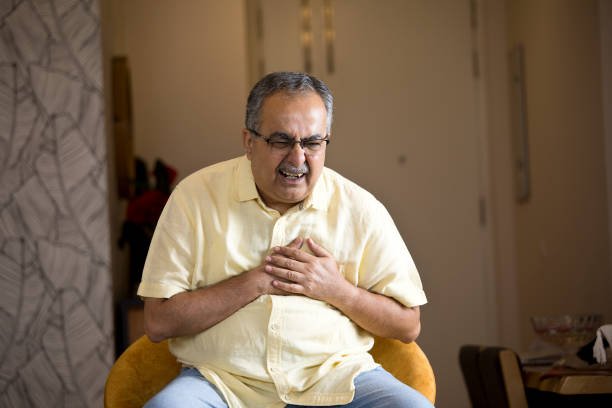Chest Pain 6 Months After Bypass Surgery
Getting through bypass surgery is a big milestone, and by now — six months later — you probably expected to feel much better. So if you’re suddenly noticing chest pain again, it’s natural to feel anxious or confused. The good news? Not all chest pain after bypass surgery is serious — but some types could be a sign that something needs attention. In this article, we’ll walk you through the possible reasons for chest pain 6 months after surgery, what’s normal, what’s not, and when it’s time to speak to your doctor.

What Exactly Is Bypass Surgery?
Bypass surgery, also called Coronary Artery Bypass Grafting (CABG), is a type of heart surgery performed to improve blood flow to the heart muscle. It’s typically recommended when one or more of the coronary arteries — the blood vessels that supply oxygen-rich blood to the heart — become narrowed or blocked due to plaque buildup (a condition called coronary artery disease).
How Does Bypass Surgery Work?
During the procedure, the cardiac surgeon takes a healthy blood vessel from another part of your body — usually your leg (saphenous vein), arm, or chest (mammary artery) — and grafts it onto the heart to create a new route or “bypass” around the blocked artery.
This allows blood to flow freely again to the heart muscle, reducing the risk of a heart attack and easing symptoms like chest pain (angina), fatigue, and shortness of breath.
Is Chest Pain 6 months after bypass surgery is Normal?
Feeling some pain or discomfort is common after bypass surgery during the first few weeks or months. But by the time you’re six months into recovery, ongoing or strong chest pain is not usually normal and should be taken seriously.
Some people might still feel light soreness or small twinges from the healing of the breastbone or chest muscles — and that can be okay. But if the pain is new, getting worse, or doesn’t go away, it could mean there’s another issue that needs to be checked by your doctor.
Common Causes of Chest Pain 6 Months After Bypass
If you’re feeling chest pain six months after your bypass surgery, it can be worrying. While not all chest pain means something serious, it’s important to know the possible reasons behind it:
1. Healing Pain (Muscle or Bone Pain)
- After surgery, your chest muscles and breastbone (sternum) take time to fully heal.
- You might feel soreness or discomfort, especially when you move or lift things.
2. Nerve Pain
- During surgery, some nerves in the chest area may get affected.
- This can cause a burning, tingling, or sharp pain that lasts for months.
3. Blocked Bypass Graft or New Blockages
- Sometimes, one of the new blood vessels (grafts) used in surgery can get blocked again.
- This can cause chest pain like before your surgery (angina), especially during activity or stress.
4. Pericarditis (Heart Lining Inflammation)
- This is swelling of the thin sac around your heart (called the pericardium).
- It can cause sharp chest pain, especially when lying down or taking deep breaths.
5. Acid Reflux (GERD)
- Sometimes, stomach acid moves up into the chest, causing a burning pain.
- This pain can feel like heart pain but is actually related to digestion.
6. Anxiety or Panic Attacks
- Worrying about your health can cause stress-related chest pain.
- It may come with fast heartbeat, sweating, or shortness of breath.
When to Call Your Doctor Immediately?
Don’t wait and wonder. Call your doctor right away, especially if:
- The chest pain is new, worse, or feels like the heart pain (angina) you had before your surgery.
- The pain spreads to your arm (especially your left), jaw, neck, or back.
- You also have shortness of breath, sweating, nausea (feeling sick), or feel dizzy.
- The pain happens when you exert yourself (like walking uphill) and gets better with rest.
- You have any chest pain that just feels “wrong” or worries you.

Diagnostic Tests Your Doctor May Recommend
- ECG (Electrocardiogram): To check heart rhythm
- Echocardiogram: To assess heart function
- Stress Test: To check for angina or blocked grafts
- CT Angiography or Cardiac Catheterization: To evaluate grafts and arteries
- Blood Tests: To rule out heart attack or inflammation

How to Prevent Chest Pain 6 Months After Bypass Surgery?
While some chest discomfort during recovery is expected, there are things you can do to reduce the risk of chest pain and keep your heart healthy after bypass surgery:
- Stick to a Heart-Healthy Diet
- Eat more fruits, vegetables, whole grains, and lean proteins.
- Cut down on salt, sugar, fried food, and processed snacks.
- Avoid alcohol and smoking completely.
1. Follow Your Heart Doctor’s Advice
- Take all medications exactly as prescribed — especially those for blood pressure, cholesterol, and blood thinning.
- Never stop or skip medicine without talking to your doctor.
2. Stay Active (But Safely)
- Do light exercises like walking or yoga, as guided by your doctor or physiotherapist.
- Don’t overexert yourself — build strength slowly and steadily.
3. Manage Stress and Anxiety
- Practice deep breathing, meditation, or join a cardiac rehab program.
- Talk to a therapist or counselor if you often feel anxious or fearful.
4. Attend Regular Follow-Ups
- Don’t miss your check-ups — they help catch issues early.
- Share any new symptoms, including chest pain or shortness of breath, with your cardiologist.
6. Watch Your Weight and Blood Sugar
If you have diabetes or are overweight, manage these conditions with lifestyle changes and medications.
Conclusion: Don’t Ignore Chest Pain After Bypass
Experiencing chest pain 6 months after bypass surgery may be due to minor healing-related reasons — but it can also signal a serious issue like graft failure or new blockages. Never self-diagnose or delay medical evaluation. Always report chest pain to your cardiologist, especially if it feels similar to your pre-surgery symptoms.
Need Expert Cardiac Care in Mumbai?
If you’re experiencing chest pain after bypass surgery, consult a trusted cardiothoracic surgeon or cardiac specialist in Mumbai today for a complete evaluation. Your heart health deserves the best attention — don’t take chances.
Frequently Asked Questions
Is it normal to feel chest pain six months after bypass surgery?
Some mild discomfort may still be present due to healing of the breastbone or nerves. However, ongoing or new chest pain after six months is not usually expected and should be discussed with a doctor to rule out any serious issues.
What could be the cause of chest pain at this stage?
Chest pain at this stage could be due to:
- Healing from surgery
- Nerve-related pain
- Blockage in the bypass graft
- Inflammation around the heart (pericarditis)
- Acid reflux
- Anxiety or stress
Each cause requires a different approach, so a medical evaluation is important.
When should I be concerned and call a heart surgery doctor?
You should seek medical help immediately if you experience:
- Pain during physical activity or emotional stress
- Tightness, heaviness, or pressure in the chest
- Pain that spreads to your arm, back, neck, or jaw
- Shortness of breath, sweating, dizziness, or nausea
These could be signs of a serious heart issue and should not be ignored.
Can chest pain after surgery be related to something non-cardiac like acidity or anxiety?
Yes, sometimes chest pain is caused by acid reflux or anxiety. However, because it can be difficult to tell the difference, it’s always safer to let a cardiologist evaluate the symptoms first.
What tests are done to find the cause of chest pain after bypass surgery?
A doctor may recommend:
- Electrocardiogram (ECG)
- Stress test or treadmill test
- Echocardiogram (2D Echo)
- CT angiography
- Blood tests
These help check the heart’s condition and ensure the bypass grafts are functioning properly.
Can I get a second opinion if I am unsure about my chest pain or previous surgery?
Absolutely. If you’re unsure about your recovery progress or want to confirm if your chest pain is related to your heart, getting a second opinion is a wise choice.
You can consult the experienced cardiology team at A1 Superspeciality Hospital, Dahisar for a thorough evaluation and peace of mind.
Who should I contact for bypass surgery or follow-up care in Mumbai?
If you’re looking for advanced cardiac care, bypass surgery, or expert guidance after surgery, A1 Superspeciality Hospital in Dahisar offers comprehensive treatment and diagnostic services. Whether you need a second opinion, a routine follow-up, or are considering bypass surgery, our team is here to help.
Contact A1 Superspeciality Hospital, Dahisar today to schedule your consultation.
